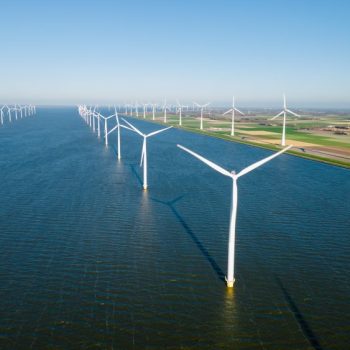
The U.K.’s hilly landscape could provide the perfect storage solution for hydropower generated underground. Instead of using mountains and dams to store hydropower energy, hundreds or even thousands of hills across Britain could offer an alternative storage solution. The new high-intensity hydro project, created by RheEnergise, pumps mineral-rich fluid R-19 up 200 metres into a hill when electricity usage is low, to be stored in an underground space as big as an Olympic-size pool. The liquid, which is two and a half times as dense as water, then flows back down the hill via generating turbines to return electricity to the grid as demand increases.
The new hydro-plant technology is expected to be both lower-cost than traditional hydro-dams and mountain sites, and more environmentally friendly. The project comes as demand for renewable energy is increasing, with renewable sources overtaking fossil fuels in U.K. electricity production for the first time in 2020.
R-19 is non-reactive and non-corrosive, according to RheEnergise, meaning it will be significantly better for the environment than existing hydro-power technologies.
As many as 700 sites could harness the power of this new technology across the U.K., providing as much as 7GW of energy storage. This would meet over half of Britain’s anticipated 2030 electricity needs.
The first high-intensity hydro-plants are expected to be seen as early as mid-2023, taking just two years to complete. This is a fraction of the time it takes to build traditional hydro-plants, meaning we can expect the form of energy to be used widely across the U.K. within the next decade.
CEO of RheEnergise, Stephen Crosher, stated of the project, “Flexible technologies like HD Hydro will form part of the UK’s smart electricity grid, supporting the integration of more low-carbon power, heat and transport technologies, which BEIS [the Department for Business, Energy and Industrial Strategy] estimates could save the UK energy system up to £40bn by 2050.”.
Other innovative ideas are also emerging as Gravitricity, established in Edinburgh, aims to lower weights into abandoned mine shafts to create electricity at a lower cost than lithium-ion batteries. Winches attached to the weights can be lowered into mine shafts using excess electricity, which then turn the winches into generators.
As the demand for fossil fuels drops, the race is on to find the best renewable solutions. And companies have realised that energy storage is vital in the new era of energy. Using wind and solar power to create energy will be key in the next decade, however this energy must be effectively stored to be used as electricity during peak demand times to meet the country’s needs.
Pumped storage and batteries are two of the current storage solutions, but other innovative technologies could provide the U.K. with the means to generate and store enough electricity to power the country without relying on fossil fuels.
Alternative projects such as these could prevent the environmental degradation seen from the current hydro-plant technologies, which are threatening Europe’s rivers. According to Steven Weiss, associate professor at the Karl-Franzens university of Graz, “We must understand that the already high demand for water resources, especially in southern Europe will be exacerbated by such large-scale hydropower exploitation, resulting in a deadly combination for freshwater diversity.”.
It seems that companies across the U.K. are being innovative in their attempt to tackle the demand for cleaner energy. A variety of energy storage options could, therefore, provide Britain with the tools to deliver on renewable energy promises by the end of the decade.
You could find more about this article on the website oilprice.com HERE – Author: Felicity Bradstock













